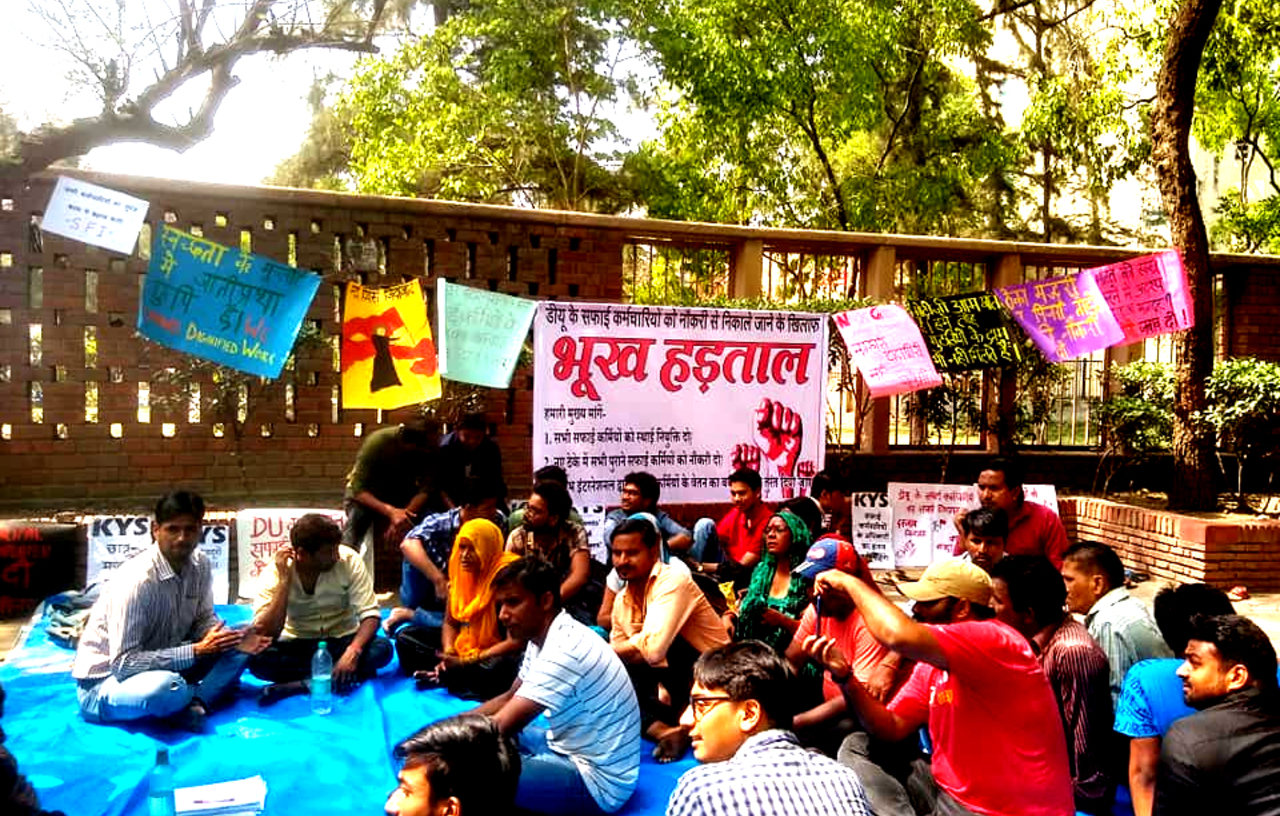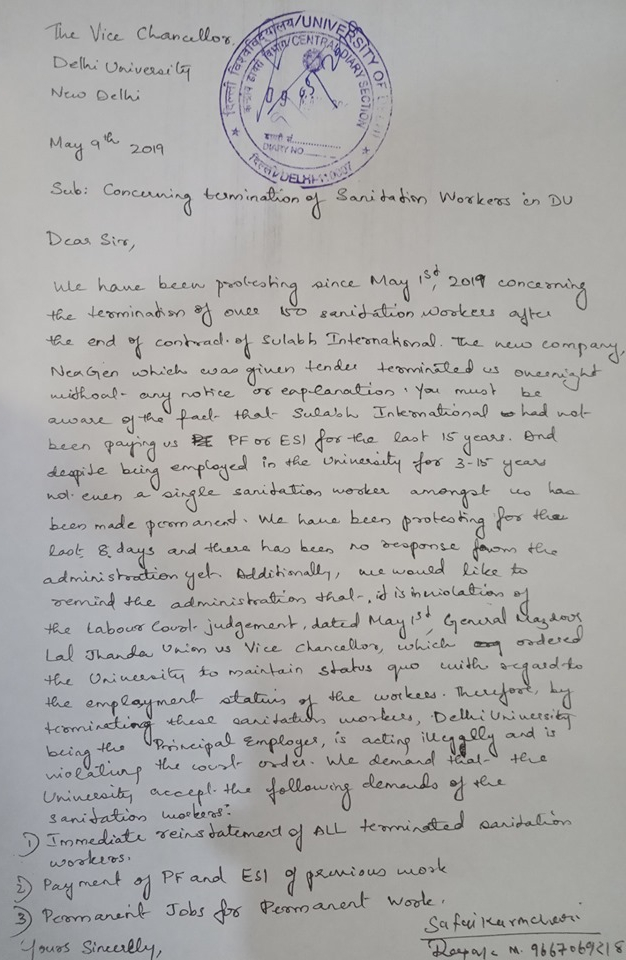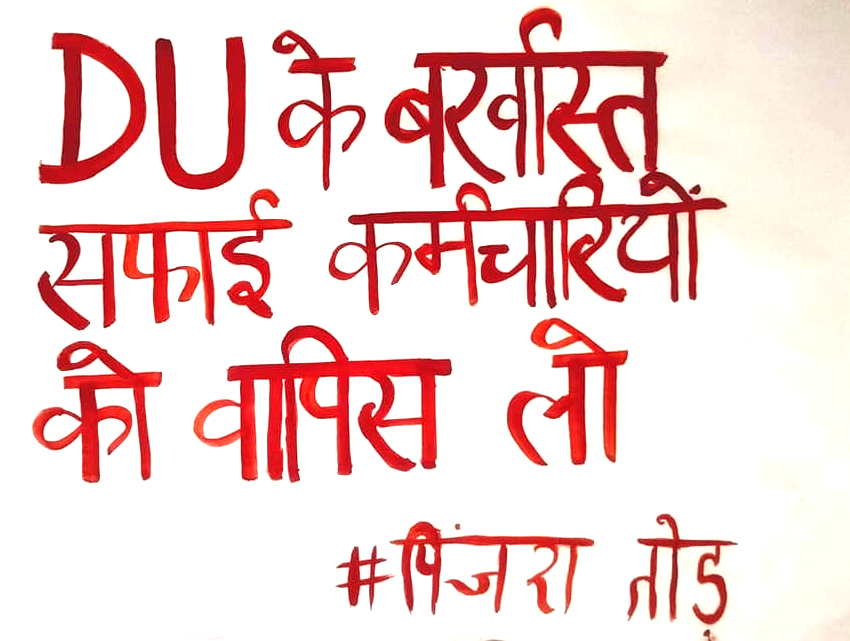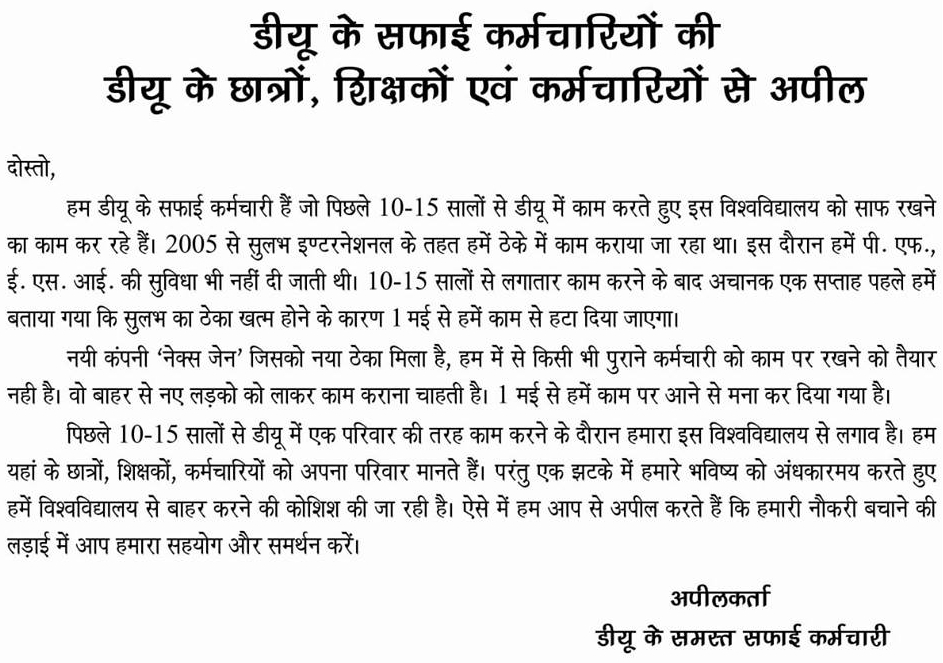Since 1st May safai karamcharis in Delhi University have been fighting for their right to dignified employment, braving the Delhi heat while dealing with the more urgent issue of keeping their families fed without employment. The promise of a democratic, independent nation that upholds human rights and the dignity of labour continues to remain unfulfilled as bondage-like employment pervades these institutions. Paroma Ray spoke to some of them.
As Narendra Modi continues to campaign for Swachh Bharat and stage empty gestures like washing the feet of safai karamcharis (cleaners), the grim reality of workers’ exploitation continues across the nation. The government as well as public institutions have failed to uphold the interests of safai karamcharis, and systematically continue to facilitate organizations like Sulabh International that extract additional work from karamcharis while providing absolutely no benefits or safety equipments to workers.
For over a decade Sulabh International (an NGO) has made its employees work for 12 hours a day without benefits or overtime payments. Even after a case was filed against Sulabh International on the issue of medical and pension benefits, it was allowed to make a bid for the new contract with the University. Nexgen Manpower Services Pvt. Ltd. replaced Sulabh as the lowest bidder, and they promised benefits, but on their very first day as the new contractor they betrayed the workers by terminating 150 of them, most of whom have given over 10 years of service to the University. Following protests, they have taken back some workers on an adhoc basis, yet the fate of most workers remain uncertain, and they are left at the mercy of the private company. Those workers who took Sulabh to court have been specifically targeted with the terminations. Despite a court order to retain them, nothing has been done to that effect. The University said there is nothing it could do and could only make an ‘appeal’ to the contractor on humanitarian grounds. It has become clear subsequently that no government body or institution is willing to step up when faced with the logic of corporate profit.
The struggle of contract safaikaramcharis of Delhi University
DU CONTRACT SAFAI KARAMCHARIYO KEH SANGHARSH KO INQUILAB ZINDABAD!Today contract safaikaramcharis of University of Delhi, who are at risk of loosing their jobs gathered at Arts Faculty on the occasion of May Day to send a loud and clear message to the administration that they will organise and collectivise for a long struggle to fight for their right to be reinstated into work and for permanent jobs for permanent work. In powerful speeches, they exposed how the government and the administration has systematically exploited their labour, denying them fair wages, holiday leave, PF and ESI amounts. It is clear that the university administration, in laying off workers without any notice, workers who have been working in the university for almost 10-15 years — is targetting them for raising their voices by filing a labour court case for non-payment of due PF and ESI amounts under the old contractor, Sulabh International. When a delegation of workers and students went inside to meet the Deputy Proctor, Swastee, she refused to give any accurate time-frame for addressing the workers' demands, and only gave 'assurances' that the administration will 'request' both the old and new contractors to 'adjust' the old workers into some jobs on 'humanitarian' grounds. The workers made it clear that their struggle against the administration as the Principal Employer will continue and only intensify, that it is the responsibility of the university administration that they are reinstated into work, and not that of the new contractor NextGen! Tomorrow students and workers will be undertaking a signature campaign and from day after tomorrow, there will be a hunger strike. Embodying the revolutionary spirit and legacy of May Day, the workers declared "ab bas hummeh ladna hi hai, iske siwa aur koi chara nahi hai, ladkehi jeeta jaata hai, bina lade kuch nahi milta"Theka pratha ko todenge, itihas ki dhara modenge! mazdoor chattra ekta ZINDABAD!#MayDay #pinjratod
Posted by Pinjra Tod: Break the Hostel Locks on Wednesday, 1 May 2019
This isn’t of course the first time that workers have had problems with the DU administration. Within the recent past there have emerged different flashpoints, such as when three years ago women workers of Daca complex hostels protested against wrongful termination, or when in Dayal Singh college bouncers were used to rough up protesting karamcharis. Recently in Lady Shri Ram college cafe workers protested along with the students to get the salaries that were owed to them by the old contractor. The workers had gone on strike previously, but the administration only stepped in when the number of protestors swelled. The security guards, who are generally deployed as a barrier between protestors and the administration, had gone on strike too, demanding benefits and overtime pay. The administration was quick to act on the demands of the security guards since without them the administration was vulnerable.
That security guards and cafe workers managed to secure their demands after protests at a college within the university, but the university administration continues to ignore the protesting safai karamcharis, goes to show the casteism embedded in the university system and it’s tendency to pit one class of workers against others. Till date the safai karamcharis who are largely from the Valmiki community aren’t provided with any safety equipments and often end up contracting infections and diseases from chemical exposure. Some safai karamcharis also spoke about how even if they were injured at work they wouldn’t be granted leave with pay.
Singing at the protests
JAARI HAI HARTAL: DU SAFAIKARAMCHARIS STRUGGLE ONJOIN DEMONSTRATION OUTSIDE PROCTOR'S OFFICE, 4TH MAY (TOM), 9am-12pmTo continue building pressure on the DU administration, which is refusing to even comply to court orders, safaikarmcharis and students will be holding a demonstration outside Proctor's Office at Arts Faculty. Demands:– Immediate Reinstation into work– Permanent Jobs for Permanent Work– Release of PF and ESI of previous work. ladenge jeetenge!#pinjratod
Posted by Pinjra Tod: Break the Hostel Locks on Friday, 3 May 2019
As Nexgen replaces Sulabh in the University, Sulabh continues to hold contracts in various colleges under DU. It must be noted that unlike Nexgen, Sulabh doesn’t pay medical benefits nor pension benefits. This goes to show that apathy towards the worker isn’t just an exception, it is the rule. There is systemic suppression of workers in the university.
Time and again the administration has taken lists of names of workers and promised to negotiate with Nexgen, but those promises remain unfulfilled. While some workers were taken back by the company, none of the protesting workers were even considered for reinstatement. These includes 35 workers who had filed a case in the labour court against Sulabh for not providing benefits. It has become clear that there is a specific targeting of those who have had a history of raising their voices. Letters have been sent to the administration by the Safai Karamchari Ayog, office of politicians like Manoj Jha, and parties like (Delhi’s current ruling) Aam Admi Party and Bhim Army (the latter even joined the protests). Despite such pressures the administration remains unresponsive. The Joint Action Committee consisting of workers and students from Pachas, KYS, Pinjra Tod, AISA, SFI and others are determined to keep the fight going, and will explore as many avenues as possible.
Adding insult to injury, the terminations were announced, without notice, on May Day. Workers have been protesting since. While I have been interacting with them as part of the process since then, for this report I spoke to some workers at a protest on 6th May, and what follows is their stories in brief.
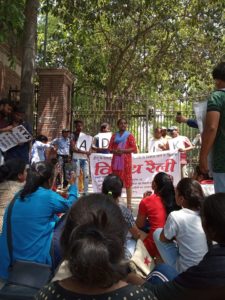 Manju, who has worked for 10 years at the University, narrated some of her fond memories. “Sometimes students would give gifts and chocolates for my kids,” she said. In the hostel the relationship with students was very good, but once she left the hostel to work in the science department, she was faced with a tricky situation – despite a good relationship with professors and students, she felt the work environment was one of fear and intimidation. A big reason for this was the behavior of some of her supervisors and the impunity that they enjoyed. “Supervisors Sandeep, Deepak and Dogra harassed some women and that scared us a lot,” she alleged. The environment was one of fear. “While they never harassed me personally,” she continued, “we women would warn all new employees regarding what the supervisors were capable of.”
Manju, who has worked for 10 years at the University, narrated some of her fond memories. “Sometimes students would give gifts and chocolates for my kids,” she said. In the hostel the relationship with students was very good, but once she left the hostel to work in the science department, she was faced with a tricky situation – despite a good relationship with professors and students, she felt the work environment was one of fear and intimidation. A big reason for this was the behavior of some of her supervisors and the impunity that they enjoyed. “Supervisors Sandeep, Deepak and Dogra harassed some women and that scared us a lot,” she alleged. The environment was one of fear. “While they never harassed me personally,” she continued, “we women would warn all new employees regarding what the supervisors were capable of.”
As Manju’s struggles at work continued, the situation in her house became extremely dire. Her husband lost his job as well, and they have had to struggle to keep their two children fed and pay their school fees. Her mother, who is also a safai karamchari in DU and was laid off with her, can’t help her out because she has to take care of her sick father. “I am taking loans by depositing gold, and if my husband can’t find a job then I will not be able to fight for long,” she said. She continued: “In the hostel we fought for our rights when we were removed without notice and we won that fight; it feels like every three years we need to fight to get things done. Our faith in the university has been shaken, but we have to keep fighting.”
Manju had a bitter message for anyone coming to the University, and said that anyone coming there to perform any kind of work should prepare themselves in advance to fight the administration, so that they can’t enslave them in the way they always try to do.
Asha has been working for around 10 years in the University. She has three children: while two are still in school, her oldest daughter is seeking employment as a typist and has a part time job in an NGO that pays Rs 5000 per month. On being asked what keeps her motivated to fight for her rights, she replied: “We don’t want to be silent. We have to fight back for the sake of justice and also for the sake of our kids. These two things keep me going.”
Reflecting on the relationships she had while working in the University, she said, “In my department everyone treated me well and I didn’t mind working for them. However, even though I had good relationships, it was not of the kind where I felt confident requesting anyone to lend me money in case of an emergency, except for one lady. Whether you get your exact demands or not, you should keep fighting.”
After speaking to Manju about the harassment by supervisors, I asked Asha what she knew about these incidents. “One woman came to me with a complaint against Sandeep, but even after the (verbal) complaint was made with university authorities they didn’t remove the supervisor, and instead transferred the complainant,” she said. “The whole environment is of gundagardi and it happens right under the nose of the administration,” argued Asha.
She too had a message for those coming into the University: “I want people to know that we are raising our voices for rights, no jobs are safe and there is no guarantee of self-respect, so chamchagiri won’t work, you’ll have to fight. We are citizens of an independent country, yet those who struggle for their rights are the ones who are vilified. If everyone united and struck then exploitation would stop.”
She noted that all companies are in cahoots trying to protect their interests against those of the workers, and continued: “Nexgen saw us as a threat but never spoke to us about why we filed a case against Sulabh. They see us as troublemakers. Sulabh wants to create a good name for itself, so they want to portray us as bad people. Without benefits how will we deal with emergencies? How are these institutions awarding such contracts to Sulabh? They said that if you are asked to work for 12 hours, you should; but they never gave us overtime payment. If they wanted free work from us they should open a religious institution that depends on voluntary labour. Why are you in a public university?”
Anil has been working in the University for around 12 years, and has always been a vocal leader of the workers. He spoke of the culture of silence that companies and the administration tried to create. “They told us that if you have to work here then shut your mouth and ears, and behave like you are deaf and dumb,” he alleged. He continued: “We didn’t listen to this so they are making us pay. They took back some workers, but on a discretionary basis. We do not support this. Silence might give you temporary benefits, but there will be no dignity in such work.”
For the safai karamcharis in DU, the struggle is not a matter of choice, nor is it simply a strategic response to a desperate situation. The workers truly believe that in the current environment there is no other way to ensure dignified employment.
Paroma Ray is an MPhil student at Delhi University and member of Pinjra Tod.
All photos courtesy Pinjra Tod.

